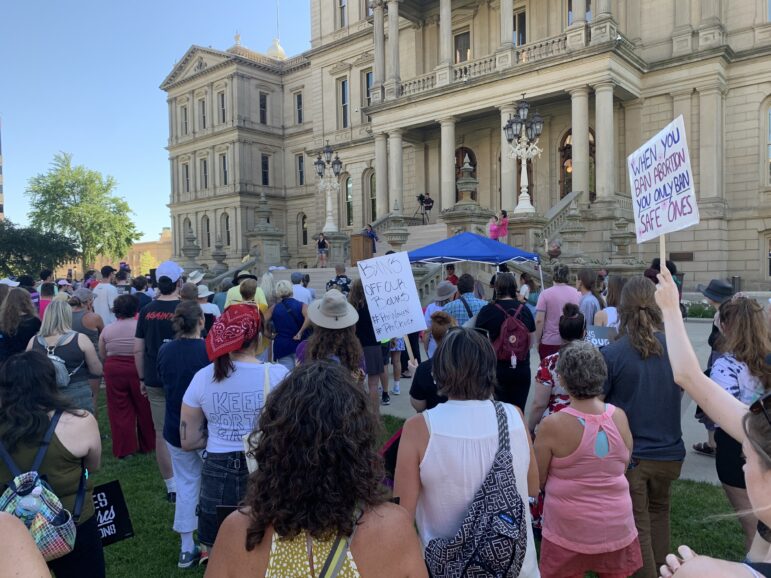Sara Gothard attempted to hold back tears while protesting at the Michigan State Capitol building on June 24.
“I knew it was going to come, I just didn’t expect it today,” Gothard, 44, said. “How can you be prepared?”
Gothard and hundreds of other people gathered at the Capitol to protest the Supreme Court’s decision to overturn the previous 50-year precedent of Roe v. Wade. This ruling leaves the decision of whether abortions are legal up to individual states.
“This [ruling] impacts everyone,” Gothard said. “It impacts children, it impacts families, it impacts people’s ability to live their lives and have freedom. Whether you’re a man, woman, or gender non-binary individual, it doesn’t matter.”
Michigan has abortion laws in the books from before Roe was decided in 1973. According to the 1931 law, the majority of abortions are considered illegal without the exception of rape or incest.
But that 1931 law in Michigan was blocked in April due to a lawsuit filed by Planned Parenthood of Michigan and Dr. Sarah Wallett. This temporarily blocks the law until a decision is made in the case.
In a Tweet from April 7, Governor Gretchen Whitmer made a statement about the lawsuit.
“No matter what happens to Roe, I am going to fight like hell and use all of the tools I have as governor to ensure reproductive freedom is protected,” Whitmer tweeted. “Today in court, I represent all those who deserve the freedom to choose their own future. That’s a fight worth having.”
Art Reyes, 35, also attended the protest in Lansing. Reyes is the leader of We the People Michigan, which seeks to support multiracial working-class individuals through education, building relationships and holding elite actors accountable in forming policies.
“Reproductive justice is critical for what it means for working-class people to be able to thrive in this country,” Reyes said. “What we saw today [the ruling] was a really horrific assault on women, on reproductive justice more broadly.”
In his concurring opinion on the overturn of Roe v. Wade, Justice Clarence Thomas stated that the Court should reconsider other rulings of precedent. The examples of cases he claimed should be reconsidered included those involving contraception and same-sex relationships and marraiges.
Julie Brixie, a state representative from the 69th House District, spoke at the Lansing protest.
“People need to be able to make those decisions for themselves. Politicians have absolutely no business making those decisions,” Brixie said in a one-on-one interview. “This is the United States of America and our country was founded on religious freedom. This really runs counter to a number of religions, not everyone’s religion tells you that abortion is wrong.”
For now, abortion is legal and accessible in Michigan. Some states in the country have banned abortion days after the ruling, others are still expected to announce bans.
“The ramifications of this are going to fall disproportionately on poor folks and women of color,” said Reyes. “This is going to result in a lot of harm, and quite frankly a lot of unneeded pain and death in many of our communities.”

Image provided by Sarah Laughner
Protestors gather at the Michigan State Capitol in response to the Supreme Court decision on Roe v. Wade